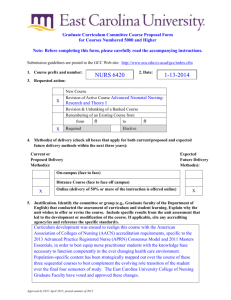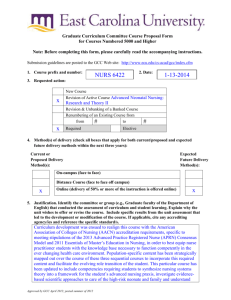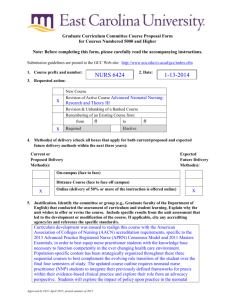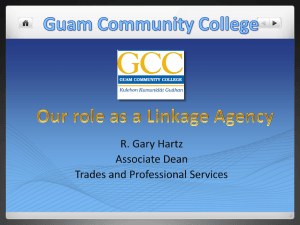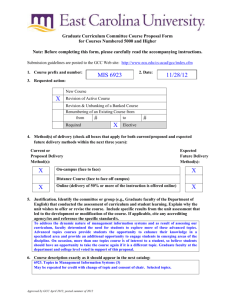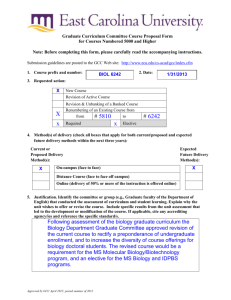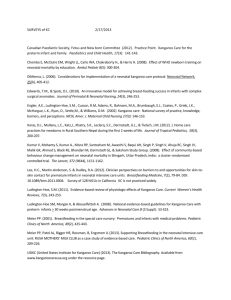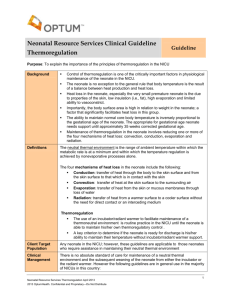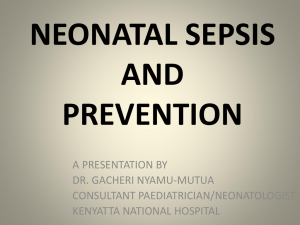Revision - East Carolina University
advertisement
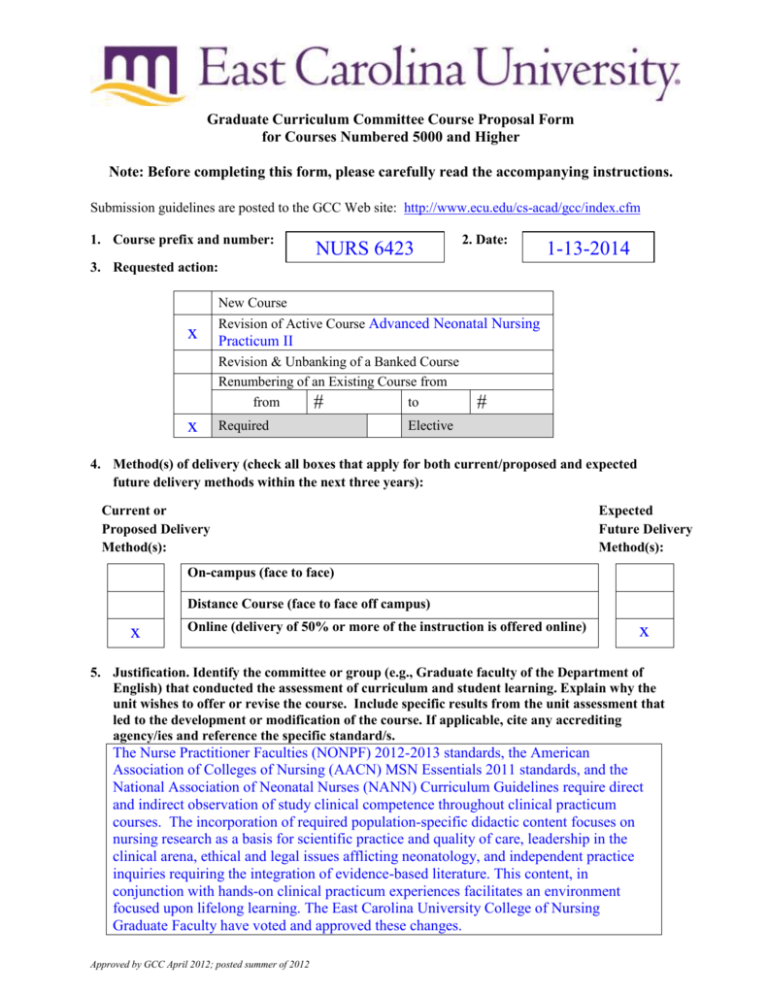
Graduate Curriculum Committee Course Proposal Form for Courses Numbered 5000 and Higher Note: Before completing this form, please carefully read the accompanying instructions. Submission guidelines are posted to the GCC Web site: http://www.ecu.edu/cs-acad/gcc/index.cfm 1. Course prefix and number: NURS 6423 2. Date: 1-13-2014 3. Requested action: New Course x Revision of Active Course Advanced Neonatal Nursing Practicum II Revision & Unbanking of a Banked Course Renumbering of an Existing Course from from to # x Required # Elective 4. Method(s) of delivery (check all boxes that apply for both current/proposed and expected future delivery methods within the next three years): Current or Proposed Delivery Method(s): Expected Future Delivery Method(s): On-campus (face to face) Distance Course (face to face off campus) x Online (delivery of 50% or more of the instruction is offered online) x 5. Justification. Identify the committee or group (e.g., Graduate faculty of the Department of English) that conducted the assessment of curriculum and student learning. Explain why the unit wishes to offer or revise the course. Include specific results from the unit assessment that led to the development or modification of the course. If applicable, cite any accrediting agency/ies and reference the specific standard/s. The Nurse Practitioner Faculties (NONPF) 2012-2013 standards, the American Association of Colleges of Nursing (AACN) MSN Essentials 2011 standards, and the National Association of Neonatal Nurses (NANN) Curriculum Guidelines require direct and indirect observation of study clinical competence throughout clinical practicum courses. The incorporation of required population-specific didactic content focuses on nursing research as a basis for scientific practice and quality of care, leadership in the clinical arena, ethical and legal issues afflicting neonatology, and independent practice inquiries requiring the integration of evidence-based literature. This content, in conjunction with hands-on clinical practicum experiences facilitates an environment focused upon lifelong learning. The East Carolina University College of Nursing Graduate Faculty have voted and approved these changes. Approved by GCC April 2012; posted summer of 2012 6. Course description exactly as it should appear in the next catalog: NURS 6423 - Advanced Neonatal Nursing Practicum II 3 May be repeated upon readmission to the concentration. P/C: NURS 6422. Expands intensive neonatal clinical and didactic experiences by focusing on acute and chronic physiologic monitoring, diagnostic reasoning, anticipatory planning, and evidence-based therapeutic strategies in the daily management and follow-up care of the high-risk neonate and family. 7. If this is a course revision, briefly describe the requested change: Revision to course description, decrease in course credit, topical outline, and required textbooks. 8. Course credit: Lecture Hours Weekly OR Lab Weekly Studio 14 1 Per Term Credit Hours OR Per Term Credit Hours s.h. Weekly OR Per Term Credit Hours s.h. Practicum Weekly OR Per Term Credit Hours Internship Weekly OR Per Term Credit Hours 126hrs 2 s.h. 3 9. Anticipated annual student enrollment: 12-18 10. Changes in degree hours of your programs: Degree(s)/Program(s) Changes in Degree Hours MSN Neonatal Nurse Practitioner none 11. Affected degrees or academic programs, other than your programs: Degree(s)/Program(s) Changes in Degree Hours n/a n/a 12. Overlapping or duplication with affected units or programs: x Not applicable Documentation of notification to the affected academic degree programs is attached. 13. Council for Teacher Education (CTE) approval (for courses affecting teacher education): x Not applicable Applicable and CTE has given their approval. Approved by GCC April 2012; posted summer of 2012 s.h. s.h. Other (e.g., independent study) Please explain. Total Credit Hours s.h. s.h. 14. University Service-Learning Committee (USLC) approval: x Not applicable Applicable and USLC has given their approval. 15. Statements of support: a. Staff x Current staff is adequate Additional staff is needed (describe needs in the box below): b. Facilities x Current facilities are adequate Additional facilities are needed (describe needs in the box below): c. Library x Initial library resources are adequate Initial resources are needed (in the box below, give a brief explanation and an estimate for the cost of acquisition of required initial resources): d. Unit computer resources x Unit computer resources are adequate Additional unit computer resources are needed (in the box below, give a brief explanation and an estimate for the cost of acquisition): e. ITCS resources x ITCS resources are not needed The following ITCS resources are needed (put a check beside each need): Mainframe computer system Statistical services Network connections Computer lab for students Software Approval from the Director of ITCS attached 16. Course information (see: Graduate Curriculum and Program Development Manual for instructions): a. Textbook(s) and/or readings: author(s), name, publication date, publisher, and city/state/country. Include ISBN (when applicable). Approved by GCC April 2012; posted summer of 2012 Required Text Books Adamkin, D. (2009). Nutritional strategies for the very low birthweight infant. New York, NY: Cambridge University Press. ISBN# 978-0521732468 American Psychological Society. (2009). Publication manual of the American Psychological Society (6th ed.). Washington, DC: Author. ISBN# 9781433805615 Cloherty, J. P., Eichenwald, E.C., Hansen, A.R., & Stark, A. R. (2011). Manual of neonatal care (7th ed.). New York, NY: Lippincott Williams & Wilkins. ISBN# 978-0781735995 Fanaroff, A., & Martin, R. (2011). Neonatal-perinatal medicine: Diseases of the fetus and newborn. (9th ed.). St. Louis, MO: Elsevier. ISBN# 9780323065450 MacDonald, M.G., & Ramasethu, J. (2012). Atlas of procedures in neonatology (5th ed.). New York, NY: Lippincott Williams & Wilkins. ISBN# 9781451144109 b. Course objectives for the course (student – centered, behavioral focus) If this is a 5000-level course that is populated by undergraduate and graduate students, there must be differentiation in the learning objectives expected. Upon completion of this course, students will be able to: 1. Incorporate neonatal physiology, pathology, and evidence-based research in the assessment of the high-risk neonate and family. 2. Apply diagnostic reasoning strategies in implementing appropriate management and treatment interventions for the care of the high-risk neonate and family. 3. Implement culturally sensitive management strategies across the continuum for care of the high-risk neonate and family. 4. Evaluate outcomes of care for the high-risk neonate and family. 5. Analyze legal, economic, ethical and sociocultural factors affecting the evidencebased care of the high-risk neonate and family. 6. Accurately implement pharmacological, invasive, and technological therapies in the daily management and care of the high-risk neonate and family. 7. Critique research findings using peer review as a means to provide, initiate, or improve the delivery of high-quality care to the high-risk neonate and family. c. Course topic outline The list of topics should reflect the stated objectives. Practicum-based learning experiences incorporate all listed objectives. Didactic modules, listed below, incorporate the course objectives as follows: 1. Research as a Basis for Scientific Practice and Quality of Care (Obj. 7) a. Appraising the literature: Strategies to assess and implement evidence-based care in the NICU b. Using best available evidence to provide continuous quality improvement in clinical practice 2. Leadership and the advanced practice nurse (Obj. 1, 2, 3, 4, 5, 6, 7) a. Student-led journal club and case presentations in the practicum arena Approved by GCC April 2012; posted summer of 2012 i. Incorporating the peer review in evaluating outcomes of care ii. Mentoring and the professional development of the novice nurse practitioner 3. Independent Practice Inquiry: Provisions for Evidence-Based Care (Obj. 1, 2, 3, 4, 5, 6, 7) a. Screening and diagnostic tools: The head ultrasound, CT scan and MRI. b. Surgical Emergencies, Necrotizing Enterocolitis and Short Gut Syndrome. c. The Cardiovascular System: Neonatal Hypertension, Hypotension and Shock, Cardiac Arrhythmias and Management of Congestive Heart Failure. d. List of course assignments, weighting of each assignment, and grading/evaluation system for determining a grade Threaded Discussions……………....…………………………...……….....10% Peer Reviewed Journal Club Presentation……………...……………….….15% Peer Reviewed Case Presentation…………….……………………….…....15% Application of Knowledge……………………………………………….…60% TOTAL: 100% Application of Knowledge as evidenced by: Clinical Journal Entries Data Entry of Clinical Experiences into Medatrax Preceptor Evaluations of NNP Student Grading: A course grade of B or above is required to progress in the NNP concentration 100-90%....................A 89.9-80%...................B 79.9-70%...................C 69.9-0%.....................F Approved by GCC April 2012; posted summer of 2012
